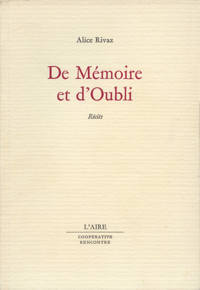The collection of nineteen short stories, De Mémoire et d’Oubli (Of memory and oblivion), was published in 1973, when Alice Rivaz was in the prime of her art. It includes the novelist’s usual topics: love, its disappointments and defeats, injustice to the disinherited and the destitute, the fear of growing old, solitude, outrage when faced with suffering and death. As the title suggests, the topic of oblivion underlies the entire collection and sets the tone for each of the short stories. The style is subtle and uncluttered, tragic, and sober, all at once, and is overwhelming in its evocative power and the compassion it inspires.
The characters in the various stories are all touching, especially little Fanny (Danse Fanny / Dance Fanny), Éric (Devine qui est là / Guess who’s here) and more elderly characters such as “le méchant homme” (the nasty man) or “le vieux militant” (the old activist). Their lack of response or revolt, and their silence confirm their suffering and the indignity of what is imposed on them.
La Machine à tricoter (The knitting machine) is particularly worth reading, for the way it depicts the task of writing compared to the manual work of knitters and menders. This short story opens up a whole new perspective. While still addressing poverty and misfortune, it sheds light on the writer’s state of mind:
Of course, I still felt the same compassion, the same outrage, but at the same time a kind of lively pleasure arose in me at the prospect of handling such a beautiful subject. Such are those who meddle with writing. “Jackals” as Romain Gary once called them, including himself.
Corinna Bille wrote to Alice while reading this book:
Last week, while in bed with the flu, I picked up your book De Mémoire et d’Oubli again (Of memory and oblivion), as it was still on my bedside table, and I did not put it down until I reached ‘La Clairière’ (The forest glade). I only have a few pages left, but I wanted to write to you as soon as I could as I was overwhelmed by your tone, your love for our suffering sisters and brothers, amazed, yes, quite simply by you…
(letter from Corinna Bille, 17 March 1974)
A fine tribute from one of her sisters in literature.

